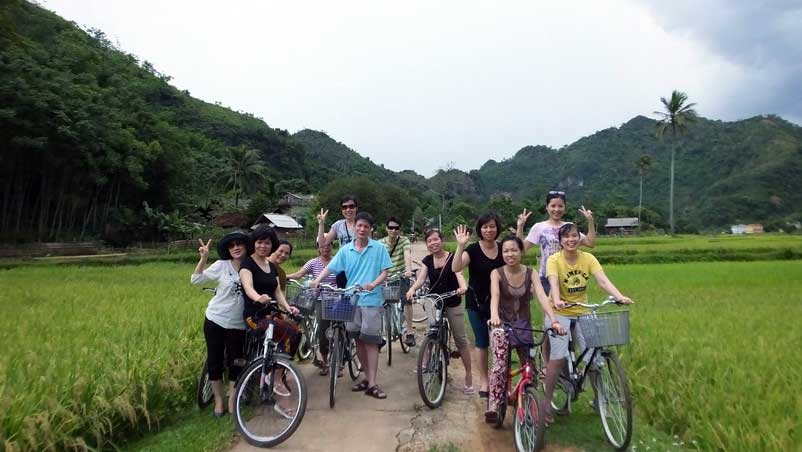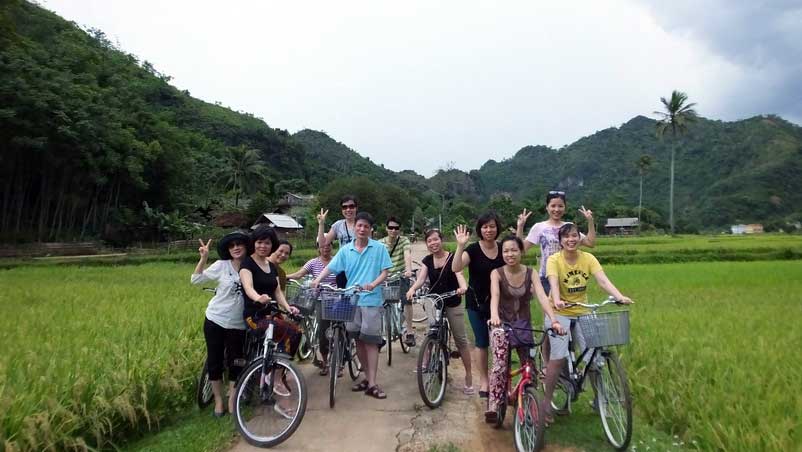
(HBO) - On the occasion of the Independence Day 2nd September, I with my friends travelled to the beautiful Mong village in Hang Kia commune (Mai Chau). We stayed at the Sung Y Mua’s homestay of Hang Kia village. This is the first time I witnessed the bustling atmosphere of enjoying the Independence Day of the Mong ethnic people, all the houses killed the buffalos, pigs and made many kinds of cakes, etc. Mong ethnic guys and girls dressed in colorful costumes to the market.

Tourists experience cycling to explore the
village of Thai ethnic people in Hich village, Mai Hich commune (Mai Chau).
Visitors are not only immersed in the scenery
and culture of the Mong ethnic village of Hang Kia commune, but also feel
interested in exploring and sightseeing to the homestay tourist destinations in
the province. On the occasion of the Independence Day 2nd September, on the
bending route of Road 6, we can easily catch the images of each other delegation
of visitor coming to the beautiful villages of Hoa Binh province.
The community- based tourism of Hoa Binh
province attracts visitors by the beautiful natural sceneries of the river and
the forest. The rooftops of stilt houses, the flowing streams are all simple
and rustic; creating the unique character of the community- based tourism
villages. The culture and customs of the Dao, Muong, Thai and Mong ethnic
people have become an attraction to tourists. Whoever comes once will want to
come back more. Tourists would have a chance to have meals, stay with and work
with the local people. These unforgettable experiences help indigenous people
and tourists to be close together. People seem to join together to share
culture and customs to better understand the cultural value of the ancient
ethnic minorities. At present, there are 150 homestay households in Da Bac, Cao
Phong, Tan Lac, Lac Son, Yen Thuy and Mai Chau districts. These are the famous
community tourism business of the province.
Mai Chau is one of the places attracting a
large number of visitors on the occasion of the Independence Day 2nd September.
According to Mai Chau District Culture and Information Board, there are 103
homestay households in the whole district. Only on the traditional holiday of 2ndSeptember, the district expected to attract more than 10 thousand visitors,
including 3600 visitors of international visitors and 6,400 people of domestic
visitors. The total revenue is estimated to be about 3.4 billion VND.
A diverse chain of eco-tourism and resort destinations concentrated in Hoa Binh city and the districts of Tan Lac, Da Bac, and Luong Son… Along with the launch of several key high-quality resort tourism projects, these developments have reshaped the landscape and enhanced the appeal of Hoa Binh as a travel destination.
Boasting diverse terrain, a mild climate, and rich natural resources, Cao Phong district is increasingly asserting its place on Vietnam’s tourism map, attracting both domestic and foreign visitors. The district is renowned for its stunning landscapes, majestic mountains, a crystal-clear hydropower lake, and the unique cultural identity of local ethnic groups.
With its pristine landscapes, unique cultural heritage of Muong ethnic minority, and an expanding range of visitor experiences, Tan Lac district of Hoa Binh has fast become a captivating destination for both domestic and international tourists.
Until now, Sung village in Cao Son commune, Da Bac district remains the only Dao ethnic community in Hoa Binh province to develop a community-based tourism model. Beyond its untouched natural landscapes, cultural identity serves as the cornerstone attraction for visitors.
Alongside the diverse cultural identities of the Kinh, Muong, Tay, Thai, Dao, and Mong ethnic people, Hoa Binh province is also renowned as the "capital" of the northwestern Vietnamese cuisine, offering unique and distinctive dishes. At festivals, during Lunar New Year (Tet), or on significant family or community occasions, special dishes are prepared, leaving a lasting impression on visitors.
A Phong Linh (Yellow Tabebuia) flower garden in Thang village, Thach Yen commune, Cao Phong district is currently in full bloom, drawing a large number of visitors.



